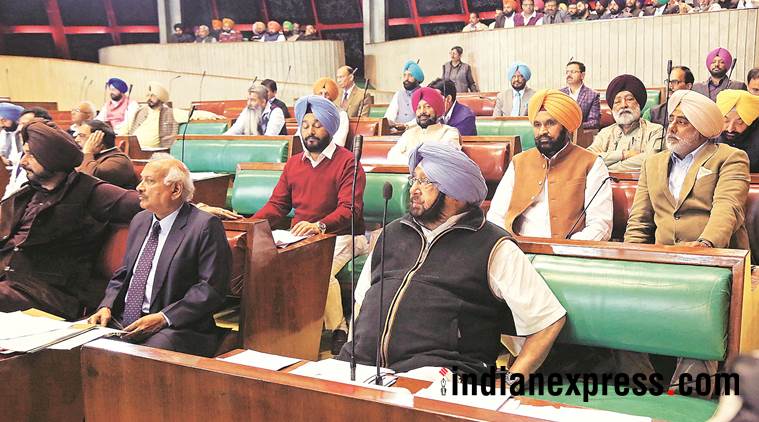 Prosecution of the Chief Ministers and MLAs can be sanctioned only with 2/3rd majority of the House under the new legislation.
Prosecution of the Chief Ministers and MLAs can be sanctioned only with 2/3rd majority of the House under the new legislation.
The Punjab Cabinet on Monday approved the new Lokayukta Bill which will bring all public functionaries including the Chief Minister in its ambit. The Bill will be introduced for passage in the ongoing session of the state Assembly.
Punjab Lokayukta Bill, 2020, seeks to replace Punjab Lokpal Act, 1996, and the new legislation will be applicable to the Chief Minister, ministers, non-officials/officials of all the public offices, with the aim of further enhancing governance and checking corruption, a government statement said. A stronger anti-corruption ombudsman was the pre-poll promise of the Congress government. The Bill was drafted months ago, but debate over the inclusion of CM and ministers delayed it.
The statement added: “The sweeping reform measure envisages an autonomous body to inquire into the grievances and allegations against public functionaries in the state, and to make provisions for appointment of Lokayukta and for the matters connected therewith. The Lokayukta will have all the powers of a civil court under the Code of Civil Procedure 1908. It will also provide for prosecution in case of false complaint.”
Prosecution of the Chief Ministers and MLAs can be sanctioned only with 2/3rd majority of the House under the new legislation. Further, all sanctions by the Assembly, whether or not permission to prosecute is granted, will be binding on the Lokayukta. According to the Bill, all complaints will be scrutinised by a screening committee of the Lokayukta before issuance of the notice. The screening committee will also take the government’s opinion in the matter.
The legislation bars a parallel probe into a complaint against any officer/public functionary if an inquiry is being conducted in the matter by the Lokayukta. Similarly, the Lokayukta will not have the authority to conduct a parallel inquiry of the matter is already under investigation by the government. The Lokayukta will consist of a chairperson, who is or has been a Judge of the High Court or the Supreme Court. Such number of members, not exceeding four, will be appointed by the government (provided that at least one of the member of the Lokayukta will be from among persons belonging to the Scheduled Castes, or the Backward Classes, or the Minorities, or Women), all of whom shall be qualified personnel with impeccable reputation.
The chairperson and members shall be appointed by the Governor on the basis of majority of the recommendation of a selection committee, consisting of the Chief Minister as chairperson, besides Speaker of the Legislative Assembly, Leader of the Opposition in the Punjab Legislative Assembly, Chief Justice of Punjab & Haryana High Court and eminent jurist nominated by the Punjab government.
FRBM
The Cabinet also gave its nod to amend the Punjab Fiscal Responsibility and Budget Management (FRBM) Act, 2003, to allow the state to make an additional borrowing of Rs 928 crore in 2019-20 over and above its net borrowing ceiling of 3 per cent of Gross State Domestic Product (GSDP).
An amendment to Section 4, in Sub-section (2), for Clause (a) of the Punjab Fiscal Responsibility and Budget Management Act, 2003, was approved by the Cabinet. In order to provide relief to the states on account of lower tax devolution during 2019-20, and in view of the hardships being faced by them in managing their finances, the Government of India had earlier decided to allow additional borrowing of Rs 58,843 crore in 2019-20 to 29 states as a one-time special dispensation, beyond the eligibility of the states.
The government statement said that the “Punjab Fiscal Responsibility and Budget Management (FRBM) Act, 2003 was enacted to provide for the responsibility of the state government to ensure inter-generational equity in fiscal management and long-term financial stability, by achieving sufficient revenue surplus, eliminating fiscal deficit and prudential debt management consistent with fiscal sustainability through limits on the state government borrowings, debt and deficits, greater transparency in fiscal operations of the state government and conducting fiscal policy in a medium-term framework and for matters connected therewith or incidental thereto”.
The Act was last amended in 2011 in conformity with the recommendations of the 13th Finance Commission. Earlier, the Cabinet meeting started with the Chief Minister complimenting Finance Minister Manpreet Singh Badal and his department for a progressive budget.
CABINET SUB-COMMITTEE
Amarinder constituted a Cabinet sub-committee to address the financial gap resulting from the systemic issues in the foodgrain procurement process. The three-member sub-committee consists of Finance Minister Manpreet Singh Badal, Rural Development & Panchayats Minister Tript Rajinder Singh Bajwa and Food & Civil Supplies Minister Bharat Bhushan Ashu.
It has been mandated to work out the modalities for the elimination of financial gap, which is to be cleared through budget provision. It will suggest ways to bring greater transparency and efficiency in the proposed Punjab Food Grains Labour & Cartage Policy, 2020-21.
CO-OPERATIVE RULES
In another decision, the Cabinet approved the formulation of the ‘Punjab Self-Supporting Co-operative Rules, 2019’ to facilitate the voluntary formation of the self-supporting co-operative societies as independent, self-reliant and democratic business enterprises. The Rules, according to the government, provide for forms of application for registration of self-supporting cooperatives, for conversion of a primary co-operative society into a self-supporting co-operative society, and for registration of amendment of bye-laws of the self-supporting cooperative society.
The Rules also include instructions on writing-off bad debts and losses, displaying the list of defaulting members of the society.
They further envisage the manner of division of area of operation of a self-supporting cooperative society into zones for various operations.